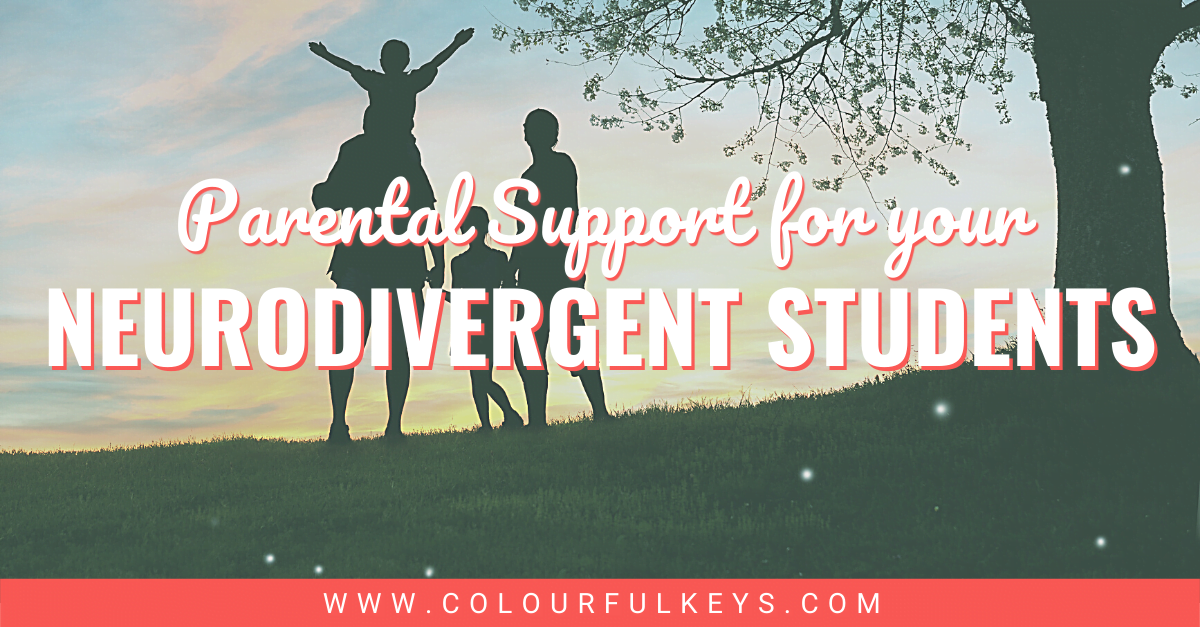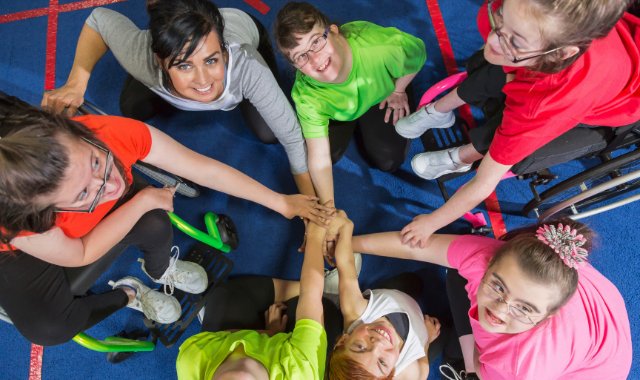
This article about how to support families of neurodivergent piano students was contributed by Rosemarie Penner. Rosemarie Penner is an analytical creative … plus online piano teacher and composer at “Must Love Music”! She loves to make learning simple, fun and interactive. When not writing articles (like this one), she enjoys reading and playing video games. For creative ideas and resources, visit Must Love Music.
While all families in our studios need support, there is one group in particular which needs extra time and energy. They are also one of my favourite clients to have. These are families with neurodivergent students.

Neurodivergent or ‘special needs’ students are students who need extra learning supports in place. While I tend to use these terms interchangeably, there is a difference.
Neurodivergent students see and interact with the world in different or unique ways. Students who fall into this category are typically diagnosed with conditions such as ADHD, ASD, Dyspraxia, or Dyslexia, and even ‘gifted and talented’. In other words, their brain function falls outside what is considered typical and, as educators, we need to keep this in mind.
‘Special needs’ is a broader category which goes beyond just the brain. It includes students with developmental delays, physical disabilities, mental health issues or learning challenges, plus those students falling under the neurodivergent category. In other words, students who are outliers on both sides of the continuum.
Depending on where you live, there may be educational acts, laws or regulations which give guidance on what parents can expect from educators. And, yes, that may include independent music teachers.
While both these terms are important, I’m going to use ‘neurodivergent’ for simplicity in this article. Many of the questions I see teachers asking in online forums tend to focus on students within this category. That being said, you can use the strategies I’m sharing to support both groups of students – not just the families with neurodivergent piano students
If you want to learn more about specific diagnoses, read more in this article.
My Journey to Teaching Neurodivergent Piano Students
When I was in my teens, I went through a stage where I wanted to learn everything about autism (which we know today as part of the ‘ASD’ umbrella.) To this day, I have no idea what inspired me. But it was the start of my journey.
My poor mum would come home from a long day at work and I’d accost her with dozens of questions. Turns out I had found her nursing textbooks, and each definition led to more questions on words I didn’t know. This was before we had such easy access to information online, so my mum was my go-to person for info.
By the time I had finished, I’d filled multiple notebooks with info on brain research and ideas of what might be going on in the mind of someone with autism.
Special Needs Education Shouldn’t be Watered Down
It was partway through my Education degree when I chose to focus on special needs education. There wasn’t that much available for courses so it was in my practicums that I learnt so much from the master teachers I worked with.
At the time, we didn’t use the term ‘neurodivergent’. All students were placed in the same general ‘special needs’ category.
I remember one teacher taught “Lord of the Rings” and other ‘hard’ books to his students. His reason? He made it clear that learning challenges don’t equate to lower IQ, so what he taught shouldn’t be watered down. Just because his students had special needs, didn’t mean they couldn’t get enjoyment out of these books…with some modifications in his teaching.
That moment has continued to inspire me over the last 2 decades as I look for ways to help my students in their playing and musical journeys.
Being Part of a Support Team
Working with neurodivergent and special needs students in my piano studio came about by accident. It wasn’t something I had decided to market, but I’m so glad those families found me!
After working as a special needs teacher, I knew how important it was for parents to feel a teacher was on their child’s side and that they were being heard. Sadly, though, I didn’t realise just how much until I was out of the classroom and teaching in my studio.

And as a parent myself, I’ve learnt first hand just how much advocating needs to happen. Even when a child is coded as ‘gifted and talented’ (as in our case).
This means that to truly support your neurodivergent music students, you need to be part of the team.
Who is on the team?
There is (hopefully) a whole support team for your neurodivergent students. This team can include various teachers (both in school and extra-curricular activities), a psychologist and a pediatrician/doctor. For special needs students, we can add an occupational therapist, speech and language specialist, physiotherapist and more.
With so many individuals working towards supporting a neurodivergent student, it’s important to ensure there aren’t conflicting approaches or goals.
As an independent music teacher, you won’t be invited to those meetings – but that doesn’t mean you can make a significant contribution.
Practical Support Options
It may seem overwhelming to (informally) join a support team. But here are a few suggestions:
- Talk to the parent about goals and strategies the team is focussed on
- Ask for a copy of the learner support plan
- Offer to fill out a psycho-education questionnaire if you know the family is having this assessment done
- Ask for a copy of the psycho-educational report
Note: I’ve used terms here related to my own community, but you can look into the equivalent or other program, plan or test done where you live and teach.
What will this look like for you?
1. Talk with the Parents
Above all else, having open, consistent and respectful conversations are a must. You will talk more with parents of neurodivergent students, and this is a good thing.
Parents are an invaluable source of information.
For example, one of the moms in my studio will text me if it’s been a rough week. Because of this, I can adapt the lesson plan and hopefully turn things around for their family.
2. Learner Support Plan
The ‘learning support plan’ goes by many names and those in power love to change the name every few years. Where I live, this plan is created by the school or – in the case of homeschooling – perhaps the governing body, such as a school board. It includes goals for the student and supports or strategies which will be used.
Getting insight into the big educational goals for your neurodivergent student means you can tailor your programming to best support them.
If the strategy is to let your student move around within a set area when they need to, then keeping them (figuratively) chained to the piano will only lead to issues. If there’s a particular signal which your student will use to show they need a break, ignoring this can lead to behavioural outbursts.
Adapting your strategies helps make sure you are the one extracurricular activity which never gets cut.
What about goals? Maybe there is a goal for your student to deal with frustration better when they don’t immediately succeed at something. Micro-opportunities to try something new with plenty of support for success can be a way to support this. Praising your student often as they make progress in this area further reinforces the progress they are making in the goal.
3. Fill Out a Questionnaire
In the United States, an important part of getting support in place for a neurodivergent student is funding. Sometimes school boards will pay for a psycho-education report, but often parents will have to pay for this out of their own pocket. It provides insight into the strengths and areas of struggle for a child. And a good report will outline some of the psychological and educational supports which would best help a child.

Especially when a student is home-schooled, you may be the only outside teacher the child sees on a regular, one-on-one basis. You won’t be able to answer every question since these questionnaires tend to be geared more toward classroom teachers. But you can provide valuable insight into how your student can thrive when appropriate supports and strategies are in place.
4. Get a Copy of the Report
If you and the parents are comfortable with it, get a copy of the psycho-educational report (or equivalent in your area.) This report will have details about family history, your student’s developmental journey, social functioning, assessment results and possible ideas to support your student. You might not be into reading the technical stuff like me, so no judgement. As we’ve established, I’m an education geek. Especially when it comes to this topic.
Tips to Support Neurodivergent Piano Families
This all sounds great, but how can you still have a level of balance between your work and your life? I can assure you this doesn’t need to lead to admin overwhelm.
I know you want to support each family in your studio. You’re reading this article, after all! 😉 But, I also want to assure you that you don’t have to give up boundaries or personal time to support families of neurodivergent piano students.
1. Reassure Parents
The first months of working with a neurodivergent student are critical. This is when the majority of other extra-curricular teachers and coaches will tell parents that the program just isn’t for their child. Why? Parents are going to be nervous that you will one week say, “I’m done. Sally didn’t behave the way I wanted, so you’re out of the studio.”
You may think this is a bit dramatic, but I’ve heard so many instances from families in the last decade of exactly this happening.
One of the first things I tell neurodivergent piano students and their families is that when an off-day happens, we’ll work as a team to figure things out and support them. This is a normal part of the process, and something we should all understand will happen. It’s not a bad thing.
I still remember one new piano mom bursting into tears when I said this. Even though she knew my educational background, her fear was that one day I would say enough is enough, and they would be left without a piano teacher.
That was 5 years ago and – while we’ve had those off-days (or even months) – we’re both incredibly happy to have this close relationship.
Being upfront about off days, right from the start, takes the pressure off.
We ALL have off days and would like our clients to give us the benefit of the doubt in those instances. Letting parents know you are prepared to adapt during those lessons and work with them takes the pressure off them and your new student.
2. Manage Expectations
As mentioned, neurodivergent piano students and their families will need extra support. So how do you do this without giving up personal time?
Manage the expectations right from the start.
Our kids have braces on their teeth. One Friday evening, one of our boys had a wire which popped out of the bracket and it was really uncomfortable for him. So I called the orthodontist’s office to leave a message.
“If you have an emergency you can call the doctor at [phone #]. Popped wires or brackets are NOT an emergency. Call back during regular office hours to set up an appointment for your child. Have a great evening!”
I laughed when I heard this. They knew their clients so well and understood that clarifying what is an emergency was necessary. The message was brilliant and a great reminder for us on how to set appropriate boundaries.

As a parent, I completely understand wanting to text or email when something is fresh in my mind. And, that’s why I let clients know they can do this. The boundary comes in with when I get back to them. Unless it’s an emergency (in my mind, not theirs), there is no response on the weekend or in the evenings. Those times are set aside for my family and personal time.
Because my clients know this, they don’t stress when there isn’t an immediate response. As one of my clients put it, “I wasn’t worried. I knew you’d get back to me when you had the chance.”
3. Make Efficient Use of Lesson Time
Rarely do I create a tutorial video or practice resource outside of lesson time. Because I teach online, the lessons are recorded (unless the parent opts out).
It’s a simple matter of:
- Stopping the recording
- Student mutes their mic
- Create a new recording for the tutorial video
- Having my student unmute
- Start a new recording for the rest of their lesson time
In fact, it probably took more time for me to write that process than the time it takes to do those steps during lessons! After the lesson, when I download the recordings, I can save the tutorial video to their shared folder within seconds.
Making All the Difference
For some neurodivergent students – especially those with severe memory issues – reminder or practice videos make all the difference during the week.
A perfect example is one of my former students back when I was still travel-teaching. Her mom had explained that by the time I got into my car on their driveway, her daughter had already forgotten the few measures we focussed on in the lesson.
Her particular challenge was getting things from short-term to long-term memory. Once we started recording videos at the end of each lesson, her practice was much more successful! She would watch the video several times, then head over to the piano to alternate between watching and playing the section. All of us were excited when she went from zero progress to making progress each week!
Find out what will help your student the most, then do this…DURING lesson time.
Your neurodivergent students will need more support. That doesn’t mean you have to always create it outside of lesson time.
4. Keep Instructions Simple
This goes for both students and parents.
Neurodivergent students in particular tend to do best with one step at a time. This takes out the mental gymnastics of sorting through all the words you just said. Instead, your student can put their energy into actually doing (vs. thinking.)

Parents of neurodivergent students get a lot of information from the support team. They already spent a huge amount of mental and physical energy supporting their child on a daily basis. So, it can be a relief when someone gives clear, succinct instructions for practice time. I tell parents:
- Specific focus for each practice activity: measure numbers, concept to master (i.e. dynamics, steady tempo, etc.)
- Strategy to use: something we’ve already practised during the lesson
- What to drop if it’s an off-day or week
These 3 things ensure that both student and parent can have success during the week. They are always included on the weekly practice page for easy reference. And, it helps avoid texts or emails with, “Practice isn’t going well. What do I do?” since this question has already been answered.
5. Scheduling
If lessons aren’t scheduled carefully you could be getting your student at a time when their mental and emotional limit has already been exceeded.
My student who got videos every lesson is a great example of this. I had taught their family in the afternoon originally. But the moment they could move to morning lessons their mom told me, “You are going to see different kids.” She was right!
I know it’s a pain to change the schedule, so I would recommend checking in with parents BEFORE lessons start. They will know when their child will have the best experience. However, if things have changed for the worse and other strategies aren’t working this might be the best (last) solution.
The Best Support You Can Provide
I mentioned at the beginning that neurodivergent piano families are among my favourite clients to work with and support. That’s because the relationships tend to be closer. There’s more weekly communication (both during lessons and in between) to best support their child. When we have appropriate strategies in place, these are the clients who tend to stay the longest.
Now you have my best strategies and ideas on how to support the neurodivergent families in your studio. All without admin overwhelm or drastically changing your approach. Just like with your neurotypical students, microchanges or goals will often make the biggest difference.
Which idea was an ‘ah-ha!’ moment for you?
Let me know in the comments below 🙂
For more resources to help you teach neurodivergent piano students, check out Nicola’s hub page devoted to Planning Lessons – including an entire section on teaching students with special needs.
